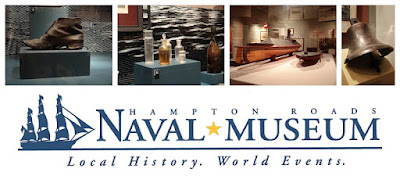In the museum's Civil War gallery is a model of the Confederate steamer CSS Patrick Henry (ex-CSS Yorktown) and a spyglass from the ship. The model was built by Bill Altice and acquired by the museum in 1986.
Patrick Henry was formerly a passenger steamer that ran between New York and Hampton Roads before being acquired by the Confederate States Navy. She displaced 1300 tons and carried 12 guns, making her one of the better early war ships in the C.S.N. Originally named Yorktown, her captain, the indomitable Commander Randolph Tucker, renamed her Patrick Henry in honor of the Virginia Revolutionary War patriot. With Tucker at the helm, Patrick Henry sortied with CSS Virginia on March 8, 1862 and attacked USS Congress and Minnesota. After the Battle of Hampton Roads, Patrick Henry evacuated up the James River and became the Confederacy's naval academy for the remainder of the war.
The ship's spyglass is one of the few remaining artifacts from the vessel. Made of brass and wood, the spy glass has two mirrors that allow the user to see far off objects more clearly. The smaller section on the right would be put up to the user's eye. That section retracts into the large section when not in use. On the wooden barrel is a hand-painted anchor, a white star, a blue commissioning pennant, and the words "CSS Patrick Henry." Spyglasses are simply hand-held telescopes and a common item aboard any ship.



I am the direct ancestor of Lt Gen. Joseph Warren Keifer. He received the sword from Commodore Tucker in the Battle of Sailer's Creek in 1865 during his surrender. General Keifer promised to return the sword during piece time because he was so impressed with the valor in which Com. Tucker had presented himself during battle. He even saved Gen. Keifer's life. For some reason, there was not the opportunity to return the sword and we still have it in our family to this day.
ReplyDeleteI would like to find the proper place or persons for the sword and return it, as my Great, gr, gr, grandfather intended. Ted Keifer